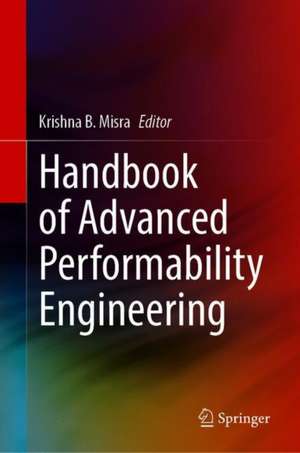Handbook of Advanced Performability Engineering
Editat de Krishna B. Misraen Limba Engleză Hardback – 17 noi 2020
The book discusses a range of new ideas, concepts, disciplines, and applications in performability, including smart manufacturing and Industry 4.0; cyber-physical systems and artificial intelligence; digital transformation of railways; and asset management.
Given its broad scope, it will appeal to researchers, academics, industrial practitioners and postgraduate students involved in manufacturing, engineering, and system and product development.
| Toate formatele și edițiile | Preț | Express |
|---|---|---|
| Paperback (1) | 1079.83 lei 38-44 zile | |
| Springer International Publishing – 17 noi 2021 | 1079.83 lei 38-44 zile | |
| Hardback (1) | 1249.00 lei 6-8 săpt. | |
| Springer International Publishing – 17 noi 2020 | 1249.00 lei 6-8 săpt. |
Preț: 1249.00 lei
Preț vechi: 1523.16 lei
-18% Nou
Puncte Express: 1874
Preț estimativ în valută:
239.02€ • 248.13$ • 199.31£
239.02€ • 248.13$ • 199.31£
Carte tipărită la comandă
Livrare economică 22 martie-05 aprilie
Preluare comenzi: 021 569.72.76
Specificații
ISBN-13: 9783030557317
ISBN-10: 3030557316
Ilustrații: XXIV, 811 p. 224 illus., 129 illus. in color.
Dimensiuni: 155 x 235 mm
Greutate: 1.34 kg
Ediția:1st ed. 2021
Editura: Springer International Publishing
Colecția Springer
Locul publicării:Cham, Switzerland
ISBN-10: 3030557316
Ilustrații: XXIV, 811 p. 224 illus., 129 illus. in color.
Dimensiuni: 155 x 235 mm
Greutate: 1.34 kg
Ediția:1st ed. 2021
Editura: Springer International Publishing
Colecția Springer
Locul publicării:Cham, Switzerland
Cuprins
Why Research in Performability Engineering is Essential in the 21st Century.- The Science and Economics of System Sustainment.- Performability Considerations for Next Generation Manufacturing Systems.- Functional Safety and Cybersecurity Analysis and Management in Smart Manufacturing Systems.- On Modelling and Performability Evaluation of Time Varying Communication Networks.- Strategic Directions for Increasing the Performability in Attracting Foreign Direct Investment: An Empirical Study of India.- Evaluation and Design of Performable Distributed Systems.- Network Invariants and Their Use in Performability Analysis.- The Circular Economy and its Benefits to the Society.- Asset Management Journey for Realising Value from Assets.- Dynamic Asset Performance Management.- Characteristics and Key Aspects of Complex Systems in Multistage Interconnection Networks.- A Simple and Accurate Approximation to Renewal Function of Gamma Distribution.- User Personalized Performance Management of Computer Devices.- Risk-Informed Design Verification and Validation Planning Methods for Optimal Product Reliability Improvement.- Information Survivability/Security Under Co-residence Attacks in Cloud Environment.- Data Resilience Under Co-residence Attacks in Cloud Environment.- Stochastic Effort Optimization Analysis for OSS Projects.- Contribution to Global Warming.-New Theory and Index.
Notă biografică
Dr. Krishna B. Misra (b.1943) is a retired eminent Professor of the Indian Institute of Technology and an internationally respected scholar, who has been involved in the field of reliability for over five decades. In 1983, he was presented with the very first Lal C. Verman award by The Institute of Electronics and Telecommunication Engineers for his contributions in reliability engineering. In 1995 Professor Misra was awarded a plaque by the IEEE Reliability Society “in recognition of his meritorious and outstanding contributions to reliability engineering and furthering of reliability engineering education and development in India.” In 2005, after retiring from IIT, Kharagpur, where he established the first-ever postgraduate course on reliability engineering in India in 1982, and the Reliability Engineering Centre in 1983, he launched the International Journal of Performability Engineering from Jaipur, India and has since led the journal as its Founder Editor-in-Chief.He has published over 250 papers in leading international journals and five books. He was elected a Fellow of Safety & Reliability Society (U.K.) in 1981. He is Fellow of Indian Academy of Science (1983) as well as India n National Academy of Engineering (1995).
Textul de pe ultima copertă
This book considers all aspects of performability engineering, providing a holistic view of the activities associated with a product throughout its entire life cycle of the product, as well as the cost of minimizing the environmental impact at each stage, while maximizing the performance. Building on the editor's previous Handbook of Performability Engineering, it explains how performability engineering provides us with a framework to consider both dependability and sustainability in the optimal design of products, systems and services, and explores the role of performability in energy and waste minimization, raw material selection, increased production volume, and many other areas of engineering and production.
The book discusses a range of new ideas, concepts, disciplines, and applications in performability, including smart manufacturing and Industry 4.0; cyber-physical systems and artificial intelligence; digital transformation of railways; and asset management.
Given its broad scope, it will appeal to researchers, academics, industrial practitioners and postgraduate students involved in manufacturing, engineering, and system and product development.
The book discusses a range of new ideas, concepts, disciplines, and applications in performability, including smart manufacturing and Industry 4.0; cyber-physical systems and artificial intelligence; digital transformation of railways; and asset management.
Given its broad scope, it will appeal to researchers, academics, industrial practitioners and postgraduate students involved in manufacturing, engineering, and system and product development.
Caracteristici
Provides an update on performability engineering Presents a holistic view of activities throughout the entire life cycle of a product Explains the balance between reducing the environmental impact of production and maximizing the performance
